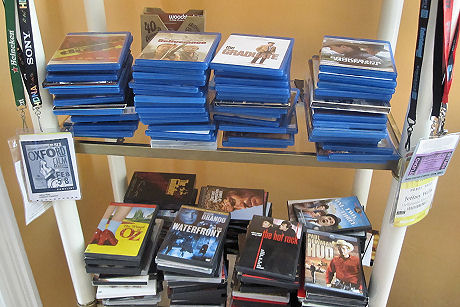I had an argument last night with Jett over my assertion that conservative righties are essentially defined by selfishness. Because they’re basically the party of “me first, taking care of my own family, the less fortunate need to get their act together and work harder, darker-skinned people are entitled to the good life but a lot of them don’t seem to really get it like we do, I-don’t-know-about-that-global-warming-stuff, I like to play golf and drive my SUV to the hardware store or the country club and do whatever the hell I want within the bounds of reason because that’s what rugged American individualists get to do,” etc.
There are wrinkles and variations and exceptions among them but righties are basically bastards and social Darwinians who live by their belief that the world is for the few, I said. And Jett felt I was talking like a demagogue.
I then said that while I don’t like to use absolute moralist terms like “good” and “evil,” one has to at least define them and use them as reference terms if you want to communicate with people. One can therefore say that the essential core quality that has to exist as a behavioral platform for evil to flourish is selfishness. Selfishness — “not them but me, not the greater good but mine” — is where all bad and ugly things begin.
It can therefore be said that in this day and age, righties are, by their relentless me-first attitudes and by certain lights and after a certain fashion, evil.
Because they only care about their own rice bowl. Because they’re still stone cold in love with the idea of being John Wayne on horseback with a rifle at the ready, and because their party is the house that welcomes and pays lip service to all the ignorant crazies out there — the beer-gut yahoos and birthers and anti-stem-cell researchers, Minutemen and hee-haw Christians (which is to say fantasists who need to believe in absurd mythology in order to embrace morality). They are the party of “hey, what about the way things used to be when rock-solid white people basically controlled everything?”
Because in an era that cries out for measures that address social inequities and benefit the greater good, for deeds and legislation that will address the financial plundering of the last 30 years and keep the buccaneers who’ve brought this country to the brink of financial Armageddon from ever again revelling in insanely lavish profiteering to the detriment of Average Joes, and which will institute policies that will stop or least slow the advance of global pollution and ruination, the righties are still in love with the idea of “get government off our backs so we can hold onto more and live lavishly and hold high the torch of Ronald Reagan and have sleazy affairs with assistants if we so choose.”
In a perfect liberal world the selfishness of the truly obstinate righties (recognizing that some righties live by a certain Barry Goldwater-ish integrity that warrants a certain respect) would simply not be tolerated any more. I’m sorry if this sounds harsh or rash but any home-owner who’s dealt with crabgrass will understand. We don’t, of course, live in a perfect world. But we can dream.
Jett was appalled. You can’t rashly define conservatives as being evil, he said. I’m not precisely doing that, I said. I’m saying that their core instincts and beliefs allow for a behavioral climate and philosophy that feeds and winks at the essence of evil.
And that this way of seeing and living life has no place in a world that’s been all but ruined by selfish plundering that has done little but fortify the lifestyles of the tennis-playing, rifle-toting, red-tie-wearing and cowboy-hatted Cheney elite. I’m saying that while everyone is basically selfish and grappling on a constant daily basis with out-for-ourselves urges, at least liberals don’t embrace a theology that celebrates selfishness — i.e., “greed is good.”
Exterminate, forbid or significantly reduce selfishness in our society and we’re obviously looking at a better world. Therefore the extermination of the right would theoretically be a reasonably good thing. Not that this is possible. I understand that. But if I ran things they would all be rounded up and sent to green internment camps for reeducation. All right, I’m kidding.
This is what people say over beers. But the only way you learn what people really think is over beers. Or when they let go with a Freudian slip or words in passing (obiter dicta) that give the game away. Or when they’re angry and arguing with their families. People are basically one-eyed jacks. The world only sees the the palatable/reasonable side of their faces and natures.






